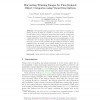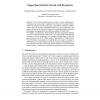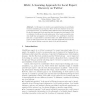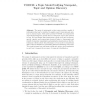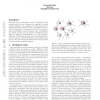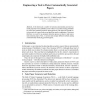ECIR
2016
Springer
9 years 10 months ago
2016
Springer
We harvest training images for visual object recognition by casting it as an IR task. In contrast to previous work, we concentrate on fine-grained object categories, such as the l...
ECIR
2016
Springer
9 years 10 months ago
2016
Springer
Abstract We deal with a problem faced by scholars every day: identifying relevant papers on a given topic. In particular, we focus on the scenario where a scholar can come up with ...
120
click to vote
ECIR
2016
Springer
9 years 10 months ago
2016
Springer
Abstract. In this paper, we explore a geo-spatial learning-to-rank framework for identifying local experts. Three of the key features of the proposed approach are: (i) a learning-b...
113
click to vote
ECIR
2016
Springer
9 years 10 months ago
2016
Springer
The surge of opinionated on-line texts provides a wealth of information that can be exploited to analyze users’ viewpoints and opinions on various topics. This article presents V...
106
click to vote
ECIR
2016
Springer
9 years 10 months ago
2016
Springer
The presentation of news articles to meet research needs has traditionally been a document-centric process. Yet users often want to monitor developing news stories based on an eve...
ECIR
2016
Springer
9 years 10 months ago
2016
Springer
Term graphs constructed from document collections as well as external resources, such as encyclopedias (DBpedia) and knowledge bases (Freebase and ConceptNet), have been individual...
ECIR
2016
Springer
9 years 10 months ago
2016
Springer
Automatic query reformulation refers to rewriting a user’s original query in order to improve the ranking of retrieval results compared to the original query. We present a gener...
104
click to vote
ECIR
2016
Springer
9 years 10 months ago
2016
Springer
The availability of data spanning different epochs has inspired a new analysis of cultural, social, and linguistic phenomena from a temporal perspective. This paper describes the...
118
click to vote
ECIR
2016
Springer
9 years 10 months ago
2016
Springer
Abstract. In the last decade, a number of nonsense automatically-generated scientific papers have been published, most of them were produced using probabilistic context free gramm...

